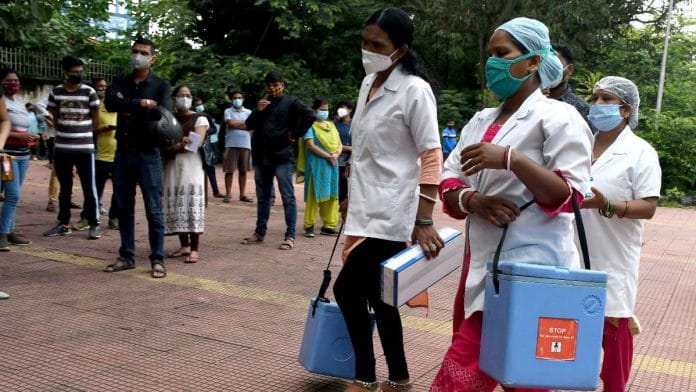New Delhi: The efficacy of vaccines in preventing severe Covid-19 — even for the Delta variant — is so high, that an additional or booster dose for the general population is not appropriate at this stage in the pandemic, said a new paper published Monday in The Lancet.
Researchers, including some at the World Health Organization (WHO) and the US Food and Drug Administration (FDA), came to this conclusion after summarising the currently available evidence from clinical trials and observational studies published in peer-reviewed journals and pre-print servers.
The researchers said that observational studies show that vaccines remain highly effective against severe disease, even when the infection is caused by the variants.
“The vaccines that are currently available are safe, effective, and save lives. Although the idea of further reducing the number of COVID-19 cases by enhancing immunity in vaccinated people is appealing, any decision to do so should be evidence-based and consider the benefits and risks for individuals and society,” Soumya Swaminathan, WHO Chief Scientist and co-author of the paper, said in a statement.
“These high-stakes decisions should be based on robust evidence and international scientific discussion,” she added.
On average, such studies show that vaccination had 95 per cent efficacy against severe disease both from the Delta and the Alpha variants, and over 80 per cent efficacy at protecting against any infection from these variants.
Although vaccines are less effective against asymptomatic disease or against transmission, even in populations with high vaccination coverage, it is the unvaccinated minority that drives the transmission, the researchers added.
“Taken as a whole, the currently available studies do not provide credible evidence of substantially declining protection against severe disease, which is the primary goal of vaccination,” lead author Ana-Maria Henao-Restrepo, head of the Research and Development Unit, WHO, said in a statement.
“The limited supply of these vaccines will save the most lives if made available to people who are at appreciable risk of serious disease and have not yet received any vaccine. Even if some gain can ultimately be obtained from boosting, it will not outweigh the benefits of providing initial protection to the unvaccinated,” she further said.
“If vaccines are deployed where they would do the most good, they could hasten the end of the pandemic by inhibiting further evolution of variants,” the paper also pointed out.
Also read: How Covid ‘downsized’ India’s influenza problem & why experts say it’s not good news yet
Condition for using boosters
The researchers note that even if levels of antibodies in vaccinated individuals wane over time, this does not necessarily predict reductions in the efficacy of vaccines against severe disease.
Protection against severe disease is mediated not only by antibody responses but also by memory responses and cell-mediated immunity — facilitated by white blood cells known as T cells and B cells, which are generally longer-lived.
If boosters are ultimately to be used, there will be a need to identify specific circumstances where the benefits outweigh the risks, the researchers conclude.
The team also notes that if new variants that can escape the current vaccine-induced immune response, they are most likely to do so from strains that have already become widely prevalent.
It would be more effective to develop booster vaccines to counter potential newer variants, than giving boosters using current vaccines.
This would be similar to a strategy used for influenza vaccines, for which each annual vaccine is based on the most current data about circulating strains, increasing the likelihood that the vaccine will remain effective even if there is further strain evolution.
(Edited by Paramita Ghosh)
Also read: How Covid is on its way to becoming just another virus






